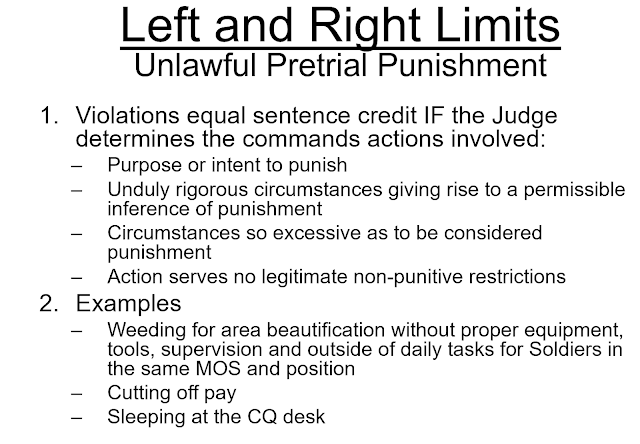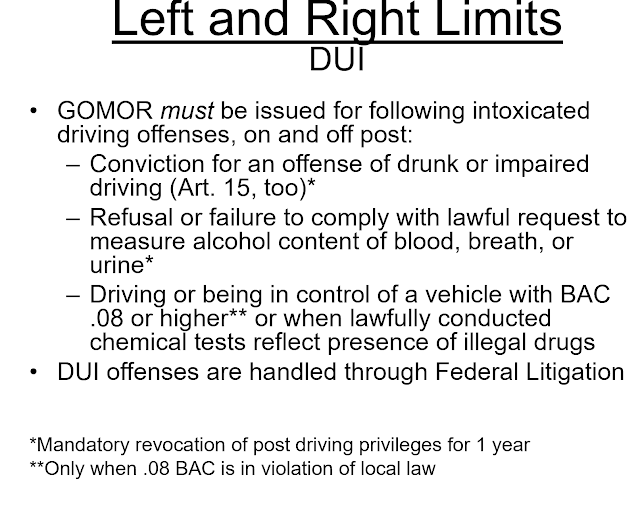An assumption of Command: Announced in a memorandum. Oral assumption only when the situation necessitates. Followed by a written assumption of command orders.
Who Assumes: Units aside from Headquarters and Headquarters Elements – Senior most Army SM. HHs: Senior most Amy SM who performs duties within the element. (i.e. Your CO XO will take over instead of the S3)
Provisional Units: Organized for a limited amount of time not to exceed two years. After 2 years a decision is made to permanently organize or disband the unit. Provisional units consist of temporarily detached personnel. Those personnel are not replaced by other SMs in their originating unit. Commanders of provisional units created as rear or home elements may have promotion or reduction authority.
1. The character of military service is no longer a consideration for offenses that are not military specific. If you are deciding how to dispose of a rape case – you don’t consider a PT score. If you are trying to figure out how to dispose of a FTR – take into account if this is a one-time mishap or if it is a pattern of bad military behavior.
2. Nature of and circumstances surrounding the offense: extent of harm caused by the offense, including the effect on morale, health, safety, welfare & discipline.
3. Appropriateness of Authorized Punishment. Here you are looking at what is appropriate for the Soldier and what is appropriate for the offense. The litmus changes based upon those two considerations. Bear in mind – some offenses inherently carry a presumption of a certain level of disposition. Murder for example – probably looking at a GCM. As always – when in doubt consult your trial counsel.
4. Possible improper motives of the accused
5. The reluctance of victim or others testify. While most witnesses can be subpoenaed and legally ordered to testify, victims have the option to decline to participate in SA cases. Oftentimes this can impact the ability to even prove the case at an administrative separation board. If you have a case where the victim has elected their right to not participate – consult your trial counsel – it’s a case by case basis on how that case will be handled.
6. Cooperation of accused.
7. Is this the only jurisdiction that can or will prosecute? Availability and likelihood of prosecution of same or similar and related charges against accused by other jurisdiction.
8.Availability and admissibility of evidence.
9. The existence of jurisdiction over accused.
10.Potential issues.
To answer the questions of when written counseling is required, see AR 635-200, paragraph 1-16.
1.Involuntary Separation due to Parenthood
2.Personality Disorder
3.Other designated physical or mental conditions
4.Entry level performance and conduct
5.Unsatisfactory performance
6.Minor disciplinary infractions or a pattern of misconduct
7.Failure to meet body fat standards
Counseling needs to be sufficiently detailed to create an accurate record. Use the 5 Ws
Examples of Involuntary Chapters: Ch 5-8 Involuntary Separation Due to Parenthood; CH 18 – Failure to meet weight control standards.
As far as which chapter – AR 635-200 lays out each chapter and when they are necessary/appropriate.
Paragraph 1-16 lays out the counseling requirements for chapters – previously discussed in the counseling portion of this presentation.
SMs are entitled to boards when they have either 6 or more years in service or are facing an OTH discharge.
Discharge::
-Honorable: A nearly flawless service record
-General: a service record that is mostly flawless with one deviation
-Multiple deviations from standards of behavior
Separation Authority – depends on what type of board that is being convened. A board convened by the special can only obtain a general discharge and may be approved by the special. A board seeking an OTH is convened by the GCMCA and he is the separation authority.
Effective Date depends on the punishment. Most are effective immediately at the 2nd reading – however, one may delay the execution of the restriction and extra duty.
Restriction: Announce the limits.
Extra Duty: any time and for any length of time within the duration of period imposed but it must not be cruel and unusual punishment, pose safety or health hazards, cannot be ridiculous or degrading and not demeaning – must be appropriate for the SMs rank.
Reduction in Rank: date of Rank = Date of punishment
Forfeiture of pay.
- Based upon the reduced grade, suspended or not and cannot exceed more than ½ of one month's pay.
R.C.M. 303: Upon receipt of information that a member of the command is accused or suspected of committing an offense or offenses triable by court-martial, the immediate commander shall make or cause to be made a preliminary inquiry into the charges or suspected offenses.
Fourth Amendment
“The right of the people to be secure in their persons, houses, papers, and effects, against unreasonable searches and seizures, shall not be violated; and no Warrants shall issue, but upon probable cause, supported by Oath or affirmation, and particularly describing the place to be searched and the persons or things to be seized.”
To Search:
Reasonable belief that the person, property, or evidence sought is located in the place or on the person to be searched.
To Seize (property or evidence):
Reasonable belief that the property/evidence is an unlawful weapon, contraband, evidence of a crime, or might be used to resist apprehension or to escape.
Fifth Amendment: No person . . . shall be compelled in any criminal case to be a witness against himself.
Miranda Warnings are triggered when there is custody and interrogation
Article 31 UCMJ: No person subject to this chapter may compel any person to incriminate himself or to answer any question the answer which may tend to incriminate him.
Article 13, UCMJ:
“No person, while being held for trial, may be subjected to punishment or penalty other than arrest or confinement upon the charges pending against him, nor shall the arrest or confinement imposed upon him be any more rigorous than the circumstances required to insure his presence, but he may be subjected to minor punishment during that period for infractions of discipline.”
R.C.M. 305
physical restraint, imposed by order of competent authority, depriving a person of freedom pending disposition of charges”
PTC is not:
As easy as bail—Much higher standard
An easy way to solve a headache
Must be:
The right offense
The right person
The right reason
No other viable restraint option
BEWARE—Restriction Tantamount to Confinement!!!
No UCMJ action if Soldier issued a DD Form 1805 (Violation Notice) on post or if Soldier has been prosecuted or being tried by civilian authorities
Not authorized w/out SJA concurrence
I Corps Supplement to AR 27-10 (DUIs are Handled in Magistrate Court OR Civilian Court)
Only in exceptional circumstances
Requests Submitted in Writing to the Criminal Law Division, ATTN: Magistrate Court Section
What could be SH:
•Maybe sexual harassment when a Servicemember:
•Engages in behavior of a sexual nature in an attempt to control, influence, or affect the career, pay, or job of a soldier through behavior of a sexual nature
•Makes deliberate or repeated verbal comments or gestures of a sexual nature that are offensive to the person to whom addressed
•Engages in abusive physical contact of a sexual nature
•Talk to your Trial Counsel.
•Mandated
by federal statute, DODD & AR
•Designed
to help victims/witnesses understand the military justice process, get
information on the status of a case, and take advantage of any entitlements to
services and funds.










































No comments:
Post a Comment